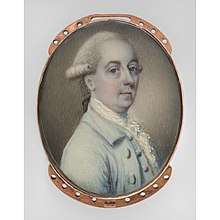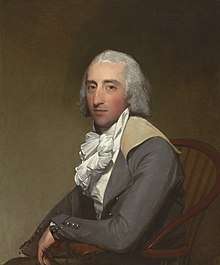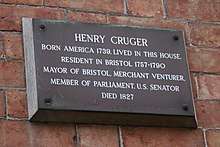Henry Cruger
Henry Cruger Jr. (November 22, 1739 – April 24, 1827) was an American and British merchant at the time of the American Revolution. He has a unique distinction of having been elected to both the Parliament of Great Britain (MP, 1774–1780, 1784–1790) and the New York State Senate (1792–1796).
Henry Cruger | |
|---|---|
 Portrait of Cruger by Luke Sullivan, 1770. | |
| Member of the New York State Senate | |
| In office July 1, 1792 – June 30, 1796 | |
| Member of the British Parliament for Bristol | |
| In office 1784–1790 Serving with Matthew Brickdale | |
| Preceded by | Matthew Brickdale George Daubeny |
| Succeeded by | Marquess of Worcester The Lord Sheffield |
| Member of the British Parliament for Bristol | |
| In office 1774–1780 | |
| Preceded by | The Earl Nugent Matthew Brickdale |
| Succeeded by | Matthew Brickdale Sir Henry Lippincott, Bt |
| Personal details | |
| Born | November 22, 1739 Province of New York, British America |
| Died | April 24, 1827 (aged 87) New York City, New York, U.S. |
| Political party | Whig Federalist |
| Spouse(s) | Hannah Peach
( m. 1765; died 1767)Elizabeth Blair
( died 1790)Caroline Smith
( m. 1799; |
| Relations | John Cruger Jr. (uncle) John Cruger (grandfather) |
| Parents | Henry Cruger Sr. Elizabeth Harris |
| Alma mater | King's College |
Early life
Henry Cruger was born in New York and was a member of a wealthy merchant family. His parents were Elizabeth (née Harris) Cruger (1716–1752) and Henry Cruger Sr. (1707–1780), a member of the New York General Assembly and then the Governor-General's Council.[1] His eldest brother, John Harris Cruger, succeeded his father as a member of the governor's council of New York, served as a Loyalist during the War and later moved to England.[2] Two other brothers settled in the West Indies.[3] His younger sister, Mary Cruger, was married to Jacob Walton, also a representative in General Assembly for New York.[4]
His paternal grandparents were Maria (née Cuyler) Cruger, an heiress (and sister of Albany Mayor Johannes Cuyler), and John Cruger, an alderman who served as the 38th mayor of New York City and was born in Bristol, England.[5] His uncle John Cruger Jr. served as the 41st mayor of New York City and was the last Speaker of the New York General Assembly.[4]
Cruger studied at King's College (now Columbia University) in New York City, but before being graduated he moved to Bristol, England in 1757.[3]
Career
Upon his relocation to Bristol, he was placed in a family mercantile house and became wealthy until the Stamp Act greatly affected his livelihood and caused him much financial embarrassment.[3] In 1765, Cruger was elected to the Bristol Common Council, a position he held until 1790. He was named sheriff of the city for 1766–1767. Cruger was elected a warden of the Society of Merchant Venturers in 1768, and Master of the Society in 1781.[6] His father, who came to England in 1775, died in Bristol in 1780.[4]
Political career
Cruger, who was known for his "ready wit and fine conversational powers," was elected as Member of Parliament for Bristol as a radical Whig in the 1774 general election in which British policy towards the colonies was an important issue.[7] The other Whig candidate, also elected, but by a smaller majority, was Edmund Burke, who was, among other things, the provincial agent for the Province of New York. In his maiden speech before Parliament, Cruger criticized it for worsening the breach between Britain and her colonies. In 1776, he faulted the ministry for abandoning British sympathizers in the colony of New York. In 1777, he supported the repeal of the Declaratory Act (1766), and by 1780, he favored American independence.[8]
Defeated for reelection in 1780, he became Bristol's mayor in 1781. In the 1784 general election, Cruger was again returned to Parliament as the member for Bristol as a supporter of William Pitt the Younger. Throughout his political career in England he urged conciliation with America. In 1789, he sought in vain for a consular appointment in the United States from Pitt.[9]
Cruger returned to New York in 1790 after an absence of 33 years and was elected as a Federalist to the New York State Senate in 1792, urging conciliation with Great Britain while serving an otherwise undistinguished single four-year term in the 16th to the 19th New York State Legislatures.[10]
Personal life

Cruger was married three times, firstly in December 1765 to Ellin Hannah Peach, a daughter of Samuel Peach of Tockington a wealthy linen draper and banker.[3] She died in 1767, leaving a son:
- Samuel Peach Cruger (1767–1845), who changed his name to Samuel Peach Peach by 1788 after inheriting his grandfather Samuel's fortune,[7] and home Tackington House, Gloucester.[11]
Cruger then married Caroline Elizabeth Blair, with whom he had six children, including:[7]
- Henry H. Cruger, who married his first cousin, Mary Cruger, daughter of Nicolas Cruger.[11]
- William Cruger.[11]
- John Cruger (1774–1812), who married Martha Ramsay (1780–1848).[12]
- Matilda Cruger (1776–1812),[13] who married Lawrence Reid Yates (d. 1796) in 1795.[7][14] After his death, she married her cousin, Judge Henry Walton, with whom she had six children.[13]
Henry and Elizabeth returned to New York in 1790, where Elizabeth died shortly thereafter. He married for the third time in 1799, when he was age 60, to Caroline Smith.[3] Together, they were the parents of four more children, including:
- Matilda Caroline Cruger (1809–1891), the wife of Thomas Jackson Oakley, a New York State Attorney General and U.S. Representative, in 1831.[15]
Cruger died at home in New York City on April 24, 1827 in his 88th year, and was buried in the Trinity Church Cemetery.[12]

Legacy
Cruger's house in Park Street, Bristol, on the corner of Great George Street, is marked by a commemorative plaque.
See also
References
- Lamb, Martha Joanna (1896). History of the City of New York: Its Origin, Rise and Progress. A. S. Barnes. p. 771. Retrieved 13 February 2018.
- "Cruger, Henry, Jr. (1739-1827), merchant, member of Parliament, mayor of Bristol, England, and New York state senator". www.anb.org. American National Biography. Retrieved 4 March 2019.
- "CRUGER, Henry (1739-1827), of Bristol". www.historyofparliamentonline.org. History of Parliament Online. Retrieved 4 March 2019.
- Reynolds, Cuyler (1914). Genealogical and Family History of Southern New York and the Hudson River Valley: A Record of the Achievements of Her People in the Making of a Commonwealth and the Building of a Nation. Lewis Historical Publishing Company. p. 1181. Retrieved 13 February 2018.
- "Porringer". www.nyhistory.org. New-York Historical Society. Retrieved 13 February 2018.
- LATIMER, JOHN. (2016). HISTORY OF THE SOCIETY OF MERCHANT VENTURERS OF THE CITY OF BRISTOL : with some account of the ... anterior merchants guilds (classic reprint). FORGOTTEN Books. ISBN 1-332-62042-6. OCLC 979767735.
- Barratt, Carrie Rebora; Stuart, Gilbert; Miles, Ellen Gross (2004). Gilbert Stuart. Metropolitan Museum of Art. p. 113. ISBN 9781588391223. Retrieved 4 March 2019.
- Sir Lewis Namier and John Brooks, eds. The House of Commons, 1754-1790, vol. 2 (Oxford University Press, 1964), 280-282.
- Henry Cruger Van Schaack, Henry Cruger: the Colleague of Edmund Burke in the British Parliament; a Paper Read before the New-York Historical Society, January 4, 1859 (New York: C. B. Richardson, 1859)
- Hough, Franklin Benjamin (1858). The New York Civil List: Containing the names and origin of the civil divisions, and the names and dates of election or appointment of the principal state and county officers from the Revolution to the present time. Weed, Parsons and Co. p. 115. Retrieved 4 March 2019.
- Bolton, Robert (1881). The History of the Several Towns, Manors, and Patents of the County of Westchester: From Its First Settlement to the Present Time. C. F. Roper. p. 182. Retrieved 4 March 2019.
- The Saint Nicholas Society of the City of New York: History, Customs, Record of Events, Constitution, Certain Genealogies, and Other Matters of Interest. V. 1-. Saint Nicholas Society of the City of New York. 1905. p. 108. Retrieved 13 February 2018.
- Association, American Art (1920). Illustrated Catalogue of the Remarkable and Widely Known Collection of Early American and British Portraits. Lent & Graff Company. p. 141. Retrieved 4 March 2019.
- "Lawrence Reid Yates". www.nga.gov. National Gallery of Art. Retrieved 4 March 2019.
- Dexter, Franklin Bowditch (1911). Biographical Sketches of the Graduates of Yale College with Annals of the College History: June 1792-September 1805. H. Holt. pp. 450–453. Retrieved 4 March 2019.
External links
- Henry Cruger at Find a Grave
- Portrait of Henry Cruger Jr. by George Romney, c. 1775 – c. 1790, at the New-York Historical Society
| Parliament of Great Britain | ||
|---|---|---|
| Preceded by Robert Craggs-Nugent Matthew Brickdale |
Member of Parliament for Bristol 1774–1780 With: Edmund Burke |
Succeeded by Matthew Brickdale Sir Henry Lippincott, Bt |
| Preceded by Matthew Brickdale George Daubeny |
Member of Parliament for Bristol 1784–1790 With: Matthew Brickdale |
Succeeded by Marquess of Worcester The Lord Sheffield |